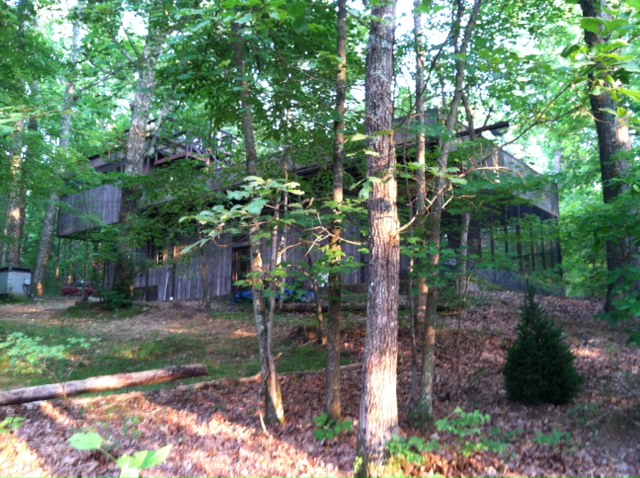I’m back with my parents after my Carleton reunion—more on the subject of reunions in an upcoming post—but I thought I’d take a moment to describe their house, given that it carries a poetic name.
My father calls it “le château ivre,” a punning homage to Rimbaud’s hypnotic poem “le bâteau ivre” (the drunken boat). As perhaps you can tell from the photo, the house was constructed to appear as though it is a boat launching itself into the forest and (to quote another mystical poem) “down the green hill athwart a cedarn cover” toward Lake Eva. (Well, down a cedarn-poplaren-oaken cover.) Inside, the front of the house resembles a quarterdeck overlooking an immense public room which is lined from bottom to top with fifteen-foot book cases. My parents have three library ladders to get to the uppermost books.
I’ve been staying in one of the upper bedrooms and feel like I’m in a tree house. When I look out, there’s a large deck and then a welter of green along with a few glimpses of the lake. Above my room there’s a crow’s nest with a table and chairs where one can go to read. From there one can see the edge of the mountain.
The Rimbaud poem is entirely appropriate, my father informs me, because it is all about launching into the unknown. Just as the exterior of the house launches into the surrounding forest, so the interior appears to launch into a world of books. The poem’s opening stanzas signal the unleashing of the imagination, with dull trading ships giving way to a child’s adventurous sense of play:
As I was going down impassive Rivers,
I no longer felt myself guided by haulers:
Yelping redskins had taken them as targets
And had nailed them naked to colored stakes.
Into the furious lashing of the tides
More heedless than children’s brains the other winter
I ran! And loosened Peninsulas
Have not undergone a more triumphant hubbub.
Given the wild swings of weather Sewanee has been experiencing recently, with beautiful blue skies alternating with clamorous thunderstorms, other parts of the poem are appropriate as well. The following stanzas get at the weather changes:
And from then on I bathed in the Poem
Of the Sea, infused with stars and lactescent,
Devouring the azure verses; where, like a pale elated
Piece of flotsam, a pensive drowned figure sometimes sinks;
Where, suddenly dyeing the blueness, delirium
And slow rhythms under the streaking of daylight,
Stronger than alcohol, vaster than our lyres,
The bitter redness of love ferments!
I know the skies bursting with lightning, and the waterspouts
And the surf and the currents; I know the evening,
And dawn as exalted as a flock of doves
And at times I have seen what man thought he saw!
My father points out that Rimbaud’s poem has its origins in Rimbaud’s childhood memories of playing in a mud puddle. In similar fashion, le château ivre is filled with many of the books that captivated my parents when they were children, Dickens and Kipling and Stevenson and the Oz books and the Lucy Fitch Perkins “Twins” series and the Burgess books and the Bookhouse books and children’s poetry anthologies without number. Here’s Rimbaud:
If I want a water of Europe, it is the black
Cold puddle where in the sweet-smelling twilight
A squatting child full of sadness releases
A boat as fragile as a May butterfly.
Because of the vividness of their childhood worlds, neither my father nor Rimbaud can ever reside in the dull and constraining world, the black cold puddle, of prosaic reality. Or as Rimbaud puts it in his closing stanza,
No longer can I, bathed in your languor, o waves,
Follow in the wake of the cotton boats,
Nor cross through the pride of flags and flames,
Nor swim under the terrible eyes of prison ships.
The worlds they imagine are as beautiful, and as fragile, as a May butterfly.


